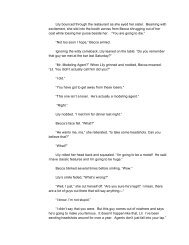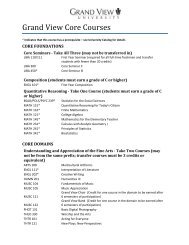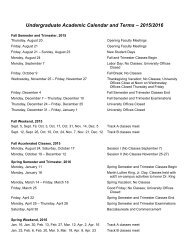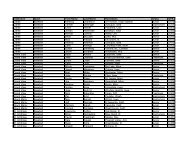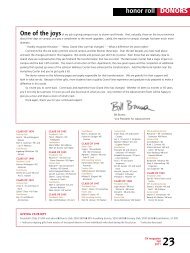MUNINN
MUNINN - Grand View University
MUNINN - Grand View University
- No tags were found...
You also want an ePaper? Increase the reach of your titles
YUMPU automatically turns print PDFs into web optimized ePapers that Google loves.
Lincoln v. Douglas <strong>MUNINN</strong> Volume 2 (2013)margin to John Todd Stuart—Lincoln’s mentor. Douglas settled forbeing the state’s secretary of state and took a seat on the IllinoisSupreme Court. In 1843, Douglas finally took his place in the USHouse of Representatives and three years later was a US Senator. 12 Allof this was by the age of 33. This fast-track career earned the shortpolitician the nickname: “Little Giant.”Douglas was passionate about western expansion and thecentrality it offered for Illinois, and especially Chicago, in trade,manufacture, and transportation. While western expansion and thepopular sovereignty compromise of slavery created anxiety for manynorthern politicians, Douglas was unconditional in his desire for theWest to be developed. It soon became apparent that “the realquestion…was not whether Douglas could be trusted to keep Northernhands off slavery in the South but whether he would be willing to givethe South what, in the 1850s, it really wanted, which was a free ticketto legalize slavery in the western territories.” 13 This can be seen inDouglas’ grand idea for expansion in his Kansas-Nebraska Act (1854)that organized the territories of Kansas and Nebraska based upon theidea of popular sovereignty. 14 Douglas defended this platform all theway into his senatorial election debates with Lincoln in 1858. AsDouglas campaigned for re-election in the later part of 1857, Lincolngave speeches of his own against Douglas’ remarks on the Kansas-Nebraska Act and popular sovereignty. By October, Lincoln’sappearances and responses were so close behind Douglas that it had theperception of a debate. This prompted U.S. Senator Norman Judd(1815-1878) to arrange for Lincoln and Douglas to face one another onthe same stand. 15Encouraged by Judd, Lincoln wrote to Douglas on July 24,1858, asking him “to make an arrangement for you and myself todivide time, and address the same audiences during the presentcanvass.” 16 Douglas refused initially, but later agreed with somespecific conditions. They agreed each congressional district in Illinoisshould hear them, so they arranged for seven debates since the districtsthat included Chicago (Second District) and Springfield (Sixth District)were already saturated with their appearances and positions. Douglaschose the cities and the dates of the debates. The first debate took placein Ottawa (Third District) on August 21 th , the second in Freeport (FirstDistrict) on August 27 st , the third in Jonesboro (Ninth District) on12Guelzo, Lincoln and Douglas , 6.13Guelzo, Lincoln and Douglas , 12.14Gerald M. Capers, Stephen A. Douglas: Defender of the Union, ed. Oscar Handlin(Boston: Little, Brown and Company, 1959), 93. Editor’s note: The Dred Scott decision(1857) of the US Supreme Court inflamed most northern politicians by nullifying federalprohibition of slavery and prohibiting blacks from becoming legal citizens.15Guelzo Lincoln and Douglas , 35, 90.16Guelzo, Lincoln and Douglas , 91.13



